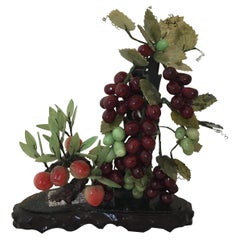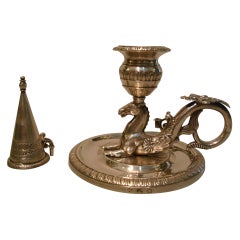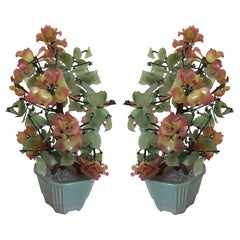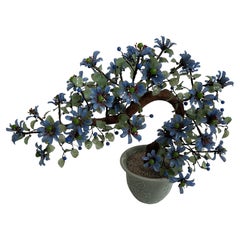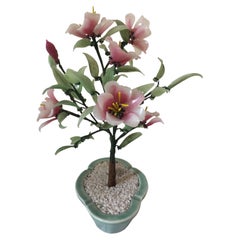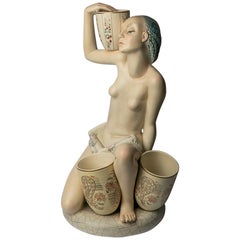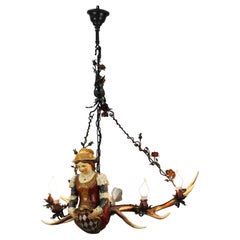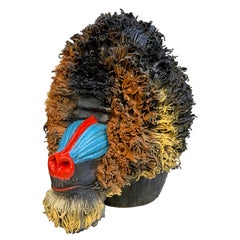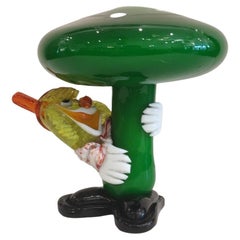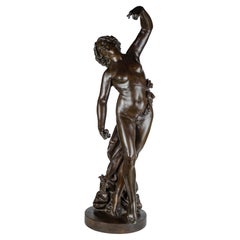Argentina Natural Specimens
to
15
1
14
5
2
7
4
1
2
7
7
5
2
1
7
7
7
4
2
2,218
787
8
7
7
7
5
Height
to
Width
to
15
15
15
1
1
Item Ships From: Argentina
Bonsai 1980, Glass and Wood
Located in Ciudad Autónoma Buenos Aires, C
We have specialized in the sale of Art Deco and Art Nouveau and Vintage styles since 1982. If you have any questions we are at your disposal.
Pushing the button that reads 'View All ...
Category
1980s Japanese Mid-Century Modern Vintage Argentina Natural Specimens
Materials
Wood, Art Glass
Silver Chamberstick / Candleholder Hippocampus / Seahorse, 1837 Munich, Germany
Located in Buenos Aires, Olivos
Silver Chamberstick / candleholder hippocampus / seahorse, circa 1837 Munich, Germany.
This silver Chamberstick retain the original detachable snuffer.
We have specialized in the sa...
Category
1830s German Early Victorian Antique Argentina Natural Specimens
Materials
Silver, Sterling Silver
Pair of Bonsai 1980, Glass and Ceramic
Located in Ciudad Autónoma Buenos Aires, C
We have specialized in the sale of Art Deco and Art Nouveau and Vintage styles since 1982. If you have any questions we are at your disposal.
Pushing the button that reads 'View All ...
Category
1980s Japanese Mid-Century Modern Vintage Argentina Natural Specimens
Materials
Art Glass, Ceramic
Big Bonsai, Glass and Ceramic
Located in Ciudad Autónoma Buenos Aires, C
We have specialized in the sale of Art Deco and Art Nouveau and Vintage styles since 1982. If you have any questions we are at your disposal.
Pushing the button that reads 'View All From Seller'. And you can see more objects to the style for sale.
Why are there so many antiques in Argentina?
In the 1880 – 1940 there was a grate wave of immigration encouraged by the periods of war that were taking place.
1st World War took place between 1914 and 1918
2nd World War took place between 1939 and 1945
The immigrants options were New York or Buenos Aires. Tickets were cheap and in Buenos Aires they were welcomed with open arms, as it was a country where everything was still to be done.
Argentina was the country of new opportunities, labour was needed and religious freedom was assured, in many cases the of the family travel first until they were settled and then the rest of the family members join them.
In the immigrant museum “Ellis Island Immigrant Building” in New York you can se the promotional posters of the boats that would take them to a new life.
Between the years 1895 and 1896, Argentina had the highest DGP (gross domestic product) per capita in the world according to the Maddison Historical Statistics index, this situation arose due to the large amount of food being exported to European countries, which were at war.
The Argentinean ships left the port of Buenos Aires with food, but they returned with furniture, clothes and construction elements, (it´s common to see this the old buildings of the historic neighbourhood of San Telmo, the beams with the inscription “Made in England)”, as well as many markets that were built in Buenos Aires, such us the San Telmo Market, whose structure was brought by ship and afterwards assembled in 900 Defensa Street.
With the great influence of European immigrants living in the country, the children of the upper classes travelled to study in France, resulting in the inauguration of “La Maison Argentinienne”, on 27th of June 1928, in the international city of Paris, which hosted many Argentinians that were studying in Frace.
It´s the fourth house to be built after France, Canada and Belgium, being the first Spanish-speaking one. Still in place today (17 Bd Jourdan, 75014, Paris, France). Many of the children of these wealthy families who attended international art exhibitions, museums and art courses abroad, took a keen interest in the European style. This is why Buenos Aires was at the time referred as “The Paris of South America”.
Between the years 1890 and 1920 more than a hundred Palaces were built on Alvear Avenue the most exclusive avenue in Buenos Aires. Today some of these palaces have been transformed into museums, hotels and embassies.
In the year 1936, the Kavanagh building was inaugurated, it was the tallest reinforced concrete building in South America.
During 1994 the American Society of Civil Engineers distinguished it as an “international engineering milestone”, and it´s now considered a World Heritage of Modern Architecture.
At the time was common to hire foreign architects such as Le Corbusier, who visited Buenos Aires/Argentina in 1929 and in 1948 he drew up the blueprints for a house built in La Plata City (which was declared a World Heritage Site).
In 1947, the Hungarian architect Marcelo Breuer designed “Parador Ariston” in the seaside city of Mar del Plata. After an Argentinean student at Harvard University convinced him to come to Argentina. He worked on an urban development project in the Casa Amarilla, area of La Boca.
The Ukrainian architect, Vladimiro Acosta, arrives in Argentina in 1928 and worked as an architect until que moved to Brazil.
Antonio Bonet, a Spanish architect who worked with Le Corbusier in Paris, arrives in Argentina in 1937, where he carried out several architectural works and in 1938 designs the well-known BFK chair.
Andres Kálnay, of Hungarian origin, made around 120 architectural masterpieces, among which the former Munich brewery stands out, he even made the furniture’s design.
The German architect, Walter Gropius, director of the Bauhaus, lived in Argentina, where he wrote articles for “Sur” magazine and founded in Buenos Aires, an architectural firm with Franz Möller, who was also an architect, where he built two houses.
At the same time several famous designers decided to immigrate to Argentina, among them we can find the well-known French designer, Jean-Michel Frank, who arrived in the country in 1940 and also worked for the Rockefeller family.
Special pieces were made, which were sold exclusively in the country, such as the well-known German company “WMF”, who sold their products by catalogue, which were chosen by the ladies of High Society in the list of wedding gifts, as well as the pieces designed by Christofle.
The Swiss sculptor Alberto Giacometti, made special pieces for Argentinean mansions.
In 1904 the first Jansen branch outside Paris was established in Buenos Aires, as the Argentinean clientele demanded a large amount of furniture, from the end of the 19th Century to the mid-20th Century.
In 1970, the brand Rigolleau Argentina made pieces authorised by Lalique.
The brands Maple and Thompson also set up shop in the country.
The French plastic artist, Marcel Duchamp moved to Argentina in 1918-1919.
Glass signed Gallé, Charder, Leverre, Schneider, Muller and other French firms. They were bought in flower shops and were given to ladies with beautiful floral arrangements.
Some furniture manufacturers travelled to international fairs and bough the patterns to produce the furniture in Argentina, such as the furniture firm Englander and Bonta, who bought the patterns ins Italy.
It is worth mentioning that in Argentina we have the largest Community of Italians outside...
Category
1980s Japanese Mid-Century Modern Vintage Argentina Natural Specimens
Materials
Art Glass, Ceramic
Bonsai Pink 1980, Glass and Wood
Located in Ciudad Autónoma Buenos Aires, C
We have specialized in the sale of Art Deco and Art Nouveau and Vintage styles since 1982. If you have any questions we are at your disposal.
Pushing the button that reads 'View All ...
Category
1980s Japanese Mid-Century Modern Vintage Argentina Natural Specimens
Materials
Art Glass, Wood
Lenci Italian Ceramic Design Helen Scavini Konig
By Lenci
Located in Buenos Aires, Argentina
Lenci, Italian ceramic
Design: Helen Scavini Konig
Ragazza di Harrar, 1936
Size: 54 cm in 21.7
Very good condition.
Category
1930s Albanian Art Deco Vintage Argentina Natural Specimens
Materials
Porcelain
Big Yellow Bonsai, Glass and Ceramic
Located in Ciudad Autónoma Buenos Aires, C
We have specialized in the sale of Art Deco and Art Nouveau and Vintage styles since 1982. If you have any questions we are at your disposal.
Pushing the button that reads 'View All ...
Category
1980s Japanese Mid-Century Modern Vintage Argentina Natural Specimens
Materials
Ceramic, Art Glass
Jar, Jugendstil, Art Nouveau, Liberty, Foundry: Eug. Blot Paris, Design: JOUANT
Located in Ciudad Autónoma Buenos Aires, C
Design: Jules Jouant (1863-1921)
Pitcher sign: Foundry: Eug. Blot Paris / Design: Jouant
Material: Silver plated
Biography
Auguste Jules Alphonse Jouant was born in Paris, Cité Fénelon, in the 9th arrondissement, on June 19, 18632, son of Étienne Alphonse Jouant, carpenter, and Louise Carré.
A student of the Ecole des Beaux-Arts in Paris3, Jules Jouant was one of Auguste Rodin's practitioners. He exhibited the Bust of Prince Gedroyc at the Salon of 1883 and sculpted busts of musicians such as Richard Wagner, Frédéric Chopin or Ludwig van Beethoven. He obtained an honorable mention at the Salon of 1913.
Jules Jouant is renowned for his works of art (vases, dishes, lamp bases, pitchers, candlesticks, table bells, trinket bowls, etc.) typical of the Art Nouveau style, produced in pewter by the Barbedienne founders This link leads to a disambiguation page, Eugène Blot and Ettlinger Frères. He also collaborates with the workshops of the Daum brothers This link returns
He was appointed professor at the Ecole Boulle in Paris.
He is buried in the Cimetière de Passy (2nd division).
Public collections
-Museum of Art and History of Belfort
seaweed, pewter
The Holly, pewter
-Mignard, marble bust, Paris, Manufacture des Gobelins7. Plaster model preserved in Angers in the Maine-et-Loire prefecture8
-Léo Delibes, marble bust, National Opera of Paris9. Plaster model preserved in the town hall of Rochefort (Charente-Maritime)
-Two bas-reliefs, stone...
Category
Early 1900s French Art Nouveau Antique Argentina Natural Specimens
Materials
Metal
Bonsai Blue 1980, Glass and Ceramic
Located in Ciudad Autónoma Buenos Aires, C
We have specialized in the sale of Art Deco and Art Nouveau and Vintage styles since 1982. If you have any questions we are at your disposal.
Pushing the button that reads 'View All From Seller'. And you can see more objects to the style for sale.
Why are there so many antiques in Argentina?
In the 1880 – 1940 there was a grate wave of immigration encouraged by the periods of war that were taking place.
1st World War took place between 1914 and 1918
2nd World War took place between 1939 and 1945
The immigrants options were New York or Buenos Aires. Tickets were cheap and in Buenos Aires they were welcomed with open arms, as it was a country where everything was still to be done.
Argentina was the country of new opportunities, labour was needed and religious freedom was assured, in many cases the of the family travel first until they were settled and then the rest of the family members join them.
In the immigrant museum “Ellis Island Immigrant Building” in New York you can se the promotional posters of the boats that would take them to a new life.
Between the years 1895 and 1896, Argentina had the highest DGP (gross domestic product) per capita in the world according to the Maddison Historical Statistics index, this situation arose due to the large amount of food being exported to European countries, which were at war.
The Argentinean ships left the port of Buenos Aires with food, but they returned with furniture, clothes and construction elements, (it´s common to see this the old buildings of the historic neighbourhood of San Telmo, the beams with the inscription “Made in England)”, as well as many markets that were built in Buenos Aires, such us the San Telmo Market, whose structure was brought by ship and afterwards assembled in 900 Defensa Street.
With the great influence of European immigrants living in the country, the children of the upper classes travelled to study in France, resulting in the inauguration of “La Maison Argentinienne”, on 27th of June 1928, in the international city of Paris, which hosted many Argentinians that were studying in Frace.
It´s the fourth house to be built after France, Canada and Belgium, being the first Spanish-speaking one. Still in place today (17 Bd Jourdan, 75014, Paris, France). Many of the children of these wealthy families who attended international art exhibitions, museums and art courses abroad, took a keen interest in the European style. This is why Buenos Aires was at the time referred as “The Paris of South America”.
Between the years 1890 and 1920 more than a hundred Palaces were built on Alvear Avenue the most exclusive avenue in Buenos Aires. Today some of these palaces have been transformed into museums, hotels and embassies.
In the year 1936, the Kavanagh building was inaugurated, it was the tallest reinforced concrete building in South America.
During 1994 the American Society of Civil Engineers distinguished it as an “international engineering milestone”, and it´s now considered a World Heritage of Modern Architecture.
At the time was common to hire foreign architects such as Le Corbusier, who visited Buenos Aires/Argentina in 1929 and in 1948 he drew up the blueprints for a house built in La Plata City (which was declared a World Heritage Site).
In 1947, the Hungarian architect Marcelo Breuer designed “Parador Ariston” in the seaside city of Mar del Plata. After an Argentinean student at Harvard University convinced him to come to Argentina. He worked on an urban development project in the Casa Amarilla, area of La Boca.
The Ukrainian architect, Vladimiro Acosta, arrives in Argentina in 1928 and worked as an architect until que moved to Brazil.
Antonio Bonet, a Spanish architect who worked with Le Corbusier in Paris, arrives in Argentina in 1937, where he carried out several architectural works and in 1938 designs the well-known BFK chair.
Andres Kálnay, of Hungarian origin, made around 120 architectural masterpieces, among which the former Munich brewery stands out, he even made the furniture’s design.
The German architect, Walter Gropius, director of the Bauhaus, lived in Argentina, where he wrote articles for “Sur” magazine and founded in Buenos Aires, an architectural firm with Franz Möller, who was also an architect, where he built two houses.
At the same time several famous designers decided to immigrate to Argentina, among them we can find the well-known French designer, Jean-Michel Frank, who arrived in the country in 1940 and also worked for the Rockefeller family.
Special pieces were made, which were sold exclusively in the country, such as the well-known German company “WMF”, who sold their products by catalogue, which were chosen by the ladies of High Society in the list of wedding gifts, as well as the pieces designed by Christofle.
The Swiss sculptor Alberto Giacometti, made special pieces for Argentinean mansions.
In 1904 the first Jansen branch outside Paris was established in Buenos Aires, as the Argentinean clientele demanded a large amount of furniture, from the end of the 19th Century to the mid-20th Century.
In 1970, the brand Rigolleau Argentina made pieces authorised by Lalique.
The brands Maple and Thompson also set up shop in the country.
The French plastic artist, Marcel Duchamp moved to Argentina in 1918-1919.
Glass signed Gallé, Charder, Leverre, Schneider, Muller and other French firms. They were bought in flower shops and were given to ladies with beautiful floral arrangements.
Some furniture manufacturers travelled to international fairs and bough the patterns to produce the furniture in Argentina, such as the furniture firm Englander and Bonta, who bought the patterns ins Italy.
It is worth mentioning that in Argentina we have the largest Community of Italians outside...
Category
1980s Japanese Mid-Century Modern Vintage Argentina Natural Specimens
Materials
Art Glass, Ceramic
Pair of Bonsai, Glass and Ceramic, 1980
Located in Ciudad Autónoma Buenos Aires, C
We have specialized in the sale of Art Deco and Art Nouveau and Vintage styles since 1982. If you have any questions we are at your disposal.
Pushing the button that reads 'View All ...
Category
1980s Japanese Mid-Century Modern Vintage Argentina Natural Specimens
Materials
Ceramic, Art Glass
Hunter with Deer Attributed to Amadeo Gennarelli, Italian, Art Deco
By Amadeo Gennarelli
Located in Ciudad Autónoma Buenos Aires, C
Materials: Silvered bronze and marble
We have specialized in the sale of Art Deco and Art Nouveau and Vintage styles since 1982.If you have any questions we are at your disposal.
Pushing the button that reads 'View All From Seller'. And you can see more objects to the style for sale.
Amedeo (sometimes Amadeo) Gennarelli (1881-1943)
An Italian/French sculptor, he was a pupil of Francesco Jerace...
Category
1920s Italian Art Nouveau Vintage Argentina Natural Specimens
Materials
Marble
Flower Boat Sculpture, 1900, Style: Jugendstil, Art Nouveau, Liberty
Located in Ciudad Autónoma Buenos Aires, C
We have specialized in the sale of Art Deco and Art Nouveau and Vintage styles since 1982. If you have any questions we are at your disposal.
Pushing the button that reads 'View All...
Category
Early 1900s French Art Nouveau Antique Argentina Natural Specimens
Materials
Marble
Tree with Flowers Sculpture, 1900, Jugendstil, Art Nouveau, Liberty, France
Located in Ciudad Autónoma Buenos Aires, C
We have specialized in the sale of Art Deco and Art Nouveau and Vintage styles since 1982. If you have any questions we are at your disposal.
Pushing the button that reads 'View All...
Category
Early 1900s French Art Nouveau Antique Argentina Natural Specimens
Materials
Iron
Sevres Pair of Pigeons 'Vinsare'
By Vinsare
Located in Buenos Aires, Argentina
Sevres pair of pigeons (Vinsare)
origin France
Art Deco period in perfect condition
circa 1930.
Category
1930s French Art Deco Vintage Argentina Natural Specimens
Materials
Ceramic
Vine Tree Sculpture, 1900, Jugendstil, Art Nouveau, Liberty, France
Located in Ciudad Autónoma Buenos Aires, C
We have specialized in the sale of Art Deco and Art Nouveau and Vintage styles since 1982. If you have any questions we are at your disposal.
Pushing the button that reads 'View All...
Category
Early 1900s French Art Nouveau Antique Argentina Natural Specimens
Materials
Iron
Related Items
German Lusterweibchen Four-Light Chandelier w. Carved Mermaid Figure and Antlers
Located in Barntrup, DE
This amazing German chandelier features a delicate hand-carved and polychrome hand-painted mythical lady or mermaid with a scaly fishtail. The adorable and handsome lady is holding a cartouche-shaped shield.
The light fixture is hung on a chain suspension, mounted on real antlers, and decorated with red and yellow wrought iron...
Category
Early 20th Century German Early Victorian Argentina Natural Specimens
Materials
Metal, Wrought Iron
$10,984
H 41.34 in W 34.26 in D 28.35 in
Colorful Chimpanzee, Ceramic Centerpiece, Handmade Design in Italy, 2021
By Mosche Bianche
Located in San Miniato PI, IT
The piece is a unique representation of a Chimpanzee in a modern way.
Our designer creates these pieces completely by hand.
Category
2010s Italian Modern Argentina Natural Specimens
Materials
Ceramic, Paint
$3,721 Sale Price / item
20% Off
H 16.54 in W 11.82 in D 13.78 in
Zebra Candleholder Sculpture
Located in Paris, FR
Sculpture candleholder zebra all hand
painted, in white porcelain with brass details.
Candleholder part on the top in solid
brass and with hand-painted porcelain.
Category
21st Century and Contemporary Italian Argentina Natural Specimens
Materials
Brass
Vintage Art Deco Style Brass Seahorse Sculpture
Located in Palm Beach, FL
Charming mid century seahorse sculpture or object of art crafted in cast brass in a stylized art deco form.
Category
Mid-20th Century American Mid-Century Modern Argentina Natural Specimens
Materials
Brass
Painted Ceramic Sculptrure "bimba e Mastello" by Sandro Vacchetti Sigend Lenci
By Sandro Vacchetti, Lenci
Located in Buenos Aires, Buenos Aires
Painted ceramic sculptrure "bimba e Mastello" by Sandro Vacchetti sigend Lenci. Italy, Torino, circa 1933.
Category
1930s Italian Art Deco Vintage Argentina Natural Specimens
Materials
Ceramic
$6,800 Sale Price
20% Off
H 15.75 in W 11.82 in D 11.03 in
Ettore Sottsass Y Limited Edition Vase in Wood and Murano Glass for Flowers
By Design Gallery Milano, Ettore Sottsass
Located in Barcelona, Barcelona
Y vase made for the collection of twenty-seven woods for Chinese artificial flowers vase by Ettore Sottsass,
Edited by Design Gallery Milano, 1995.
Limited edition of 12 numbered pi...
Category
1990s European Modern Argentina Natural Specimens
Materials
Glass, Wood
$7,293 Sale Price
35% Off
H 19.3 in W 12.6 in D 9.06 in
1930s Torino Glazed Porcelain Sculpture of Seated Venus on Shell by Lenci, Italy
By Lenci
Located in North Miami, FL
1930s Torino glazed porcelain sculpture of seated Venus on shell over dolphins, manufactured by Lenci, Italy
By: Lenci
Material: ceramic, porcelain, enamel, paint, clay
Technique: c...
Category
1930s Italian Art Deco Vintage Argentina Natural Specimens
Materials
Enamel
$2,100
H 8 in W 8 in D 6 in
White Lion, Ceramic Centerpiece, Handmade Design in Italy, 2021
By Mosche Bianche
Located in San Miniato PI, IT
The piece is a unique representation of a Lion in a modern way. The animal is gently painted with a cream colour.
Our designer creates these pieces completely by hand.
Category
2010s Italian Modern Argentina Natural Specimens
Materials
Ceramic, Paint
$3,927 Sale Price / item
20% Off
H 16.54 in W 13.78 in D 13.78 in
Antique German Sterling Silver Table Owl
Located in Jesmond, Newcastle Upon Tyne
A magnificent, fine and impressive antique cast German sterling silver table owl; part of our continental ornamental silverware collection.
This magnificent antique cast German silver table ornament has been realistically modelled in the form of a owl.
This antique silver owl ornament...
Category
1910s German Vintage Argentina Natural Specimens
Materials
Silver
Pair of Ceramic Vases Sculptures One of a Kind Signed by French Ceramist Dalo
By Dalo
Located in Paris, FR
A set of two "Idoles", decorative vases in clay with stylized faces, handmade by French ceramicists Dalo
Earthenware with shiny blue and green enamel
One of a kind, creation 2022 s...
Category
21st Century and Contemporary Argentina Natural Specimens
Materials
Ceramic
$2,173 Sale Price / set
20% Off
H 7.49 in Dm 5.12 in
Enamel Ceramic Sculpture by Abele Jacopi Signed Lenci, Italy
By Lenci
Located in Buenos Aires, Buenos Aires
Enamel ceramic sculpture by Abele Jacopi (1882-1957) signed Lenci. Art Deco period, Italy, circa 1950.
Category
1950s Italian Art Deco Vintage Argentina Natural Specimens
Materials
Ceramic
Chaumet Paris, a French Silver-Gilt Seahorse Mounted Rhodochrosite Cup
By Chaumet
Located in Queens, NY
Chaumet Paris, A French Silver-Gilt Seahorse Mounted Rhodochrosite cup
Circa 1980.
An exceptional object
A quadrangular cut cup in rhodochrosite and the handle made of a sea...
Category
Late 20th Century French Brutalist Argentina Natural Specimens
Materials
Sterling Silver
$14,000 Sale Price
60% Off
H 7 in W 5.5 in D 3 in
Previously Available Items
Venetian Murano Clown Under The Mushroom
Located in Ciudad Autónoma Buenos Aires, AR
Venetian Murano Clown Under The Mushroom
Murano, Italy art glass clown and mushroom figurine. The clown is holding on to the mushroom stem and look...
Category
1950s Italian Mid-Century Modern Vintage Argentina Natural Specimens
Materials
Art Glass
Art Nouveau Bronze Dancer
Located in Buenos Aires, Argentina
Art nouveau bronze dancer
Material: bronze
Circa 1900 Origin France
Signed on its base with illegible signature
It represents a dancer with castanets in ...
Category
Early 1900s French Art Nouveau Antique Argentina Natural Specimens
Materials
Bronze
Kiss Aguste Moreau, Bronze
By August Moreau
Located in Buenos Aires, Argentina
Artist August Moreau
Title: The Kiss
Circa 1900 Origin France
Colin and Cia bronze foundry signed on the base Colin and Cia
Excellent condition
It is signed on its base.
Category
Early 1900s French Neoclassical Antique Argentina Natural Specimens
Materials
Bronze
Sculpture of a Boy with Wolf Skin, Bronze
By A. Caron
Located in Buenos Aires, Argentina
Sculpture of a boy with wolf skin - Bronze -
Artist Alexander Auguste Caron
- 1857 1932 -
Origin France circa 1920
perfect condition.
Category
1920s French Art Deco Vintage Argentina Natural Specimens
Materials
Bronze
Bronze Art Nouveau Louis Kley
By Louis Kley
Located in Buenos Aires, Argentina
Bronze Art Nouveau motif (livelula) Louis Kley
gilt bronze and onix
Artist Louis Kley circa 1900
perfect condition Origin France.
Art nouveau, modernist art or modernism was an inter...
Category
Early 1900s French Art Nouveau Antique Argentina Natural Specimens
Materials
Bronze
Porcelain Sheep 'Meissen'
By Meissen Porcelain
Located in Buenos Aires, Argentina
Porcelain sheep (Meissen)
Origin Germany
perfect condition
19th century 1870.
Category
1870s German Arts and Crafts Antique Argentina Natural Specimens
Materials
Porcelain
Recently Viewed
View AllMore Ways To Browse
Faience Miniature
Faux Stone Cabinet
Federal Tilt Top Table
Flair Firenze
French Cast Iron Bench
French Chinoiserie Sculptures
French Cicada
French Tilt Top Round Table
French Walnut Enfilade
French Washstand
French Wicker Bar Cart
Frosted Glass Figurines
Georg Jensen Teapot
George Nelson For Herman Miller Basic Cabinet Series
German Corner Shelf
German Music Box
Ginger Jars And Stands
Glass Ice Jug
